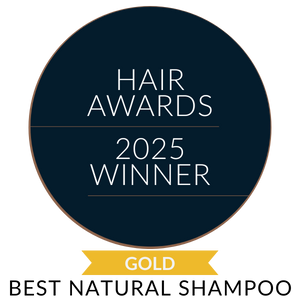Menopause and Your Hair: Understanding the Science to Find Solutions
Menopause is a natural transition, but let’s be honest, it can sometimes feel anything but natural when it comes to our hair. For many women, changes in hair and scalp health are some of the most visible and emotionally charged symptoms. Thinning, dryness, and changes in texture don’t just alter how hair looks; they can touch deeply on self-image and confidence.
The good news? When we understand the science behind these changes, we can make smarter, more nurturing choices to support hair and scalp health; and rediscover hair we love.
The Science Behind Menopausal Hair Changes
Hormonal shifts during perimenopause and menopause — particularly the decline in oestrogen and progesterone — have a profound impact on hair. Oestrogen normally helps to keep strands in the anagen (growth) phase for longer, giving us thicker, fuller hair. As oestrogen declines, more follicles shift into the telogen (resting) phase, leading to increased shedding and finer regrowth.
💡 Did you know?
The average person loses 50–100 hairs per day, but during menopause, this number often increases.
The anagen phase, which can last 3–7 years in younger women, may shorten with age, reducing the length and thickness of hair.
Hair diameter also changes: studies show that with age, the individual strands become finer, giving the appearance of overall thinning.
Coupled with changes in scalp oil production, many women also notice drier, more fragile strands and increased frizz.
Why Your Haircare Choices Matter
When hair is already more vulnerable, the products you use can make all the difference.
-
Silicone-free: While silicones give an instant ‘slip’ and shine, they can coat the hair and scalp, blocking moisture and nutrients. Over time, this can exacerbate dryness and dullness.
-
Sulphate-free: Harsh sulphates strip away natural oils, leaving hair even more dehydrated. Switching to gentle, sulphate-free cleansers supports a healthier scalp microbiome and helps the hair retain hydration.
-
Natural ingredients: Plant-based ingredients such as Amla, Rice Aminos, Sea Kelp, and Horsetail Extract are not only gentler on fragile hair but are also more nutrient-dense than many synthetic alternatives. Rich in vitamins, minerals, and antioxidants, they strengthen follicles, reduce inflammation, and restore shine — supporting both scalp and hair health.
By supporting both the scalp and the hair shaft, these choices help restore balance at a time when the body is asking for more care.
A Caring, Uplifting Approach
Menopause may change your relationship with your hair, but it doesn’t mean giving up on feeling fabulous. With the right care, hair can still be full of life, shine, and movement.
At GF Fabulosity, we’ve designed our products to support exactly these needs: natural, silicone-free, sulphate-free, and packed with ingredients that nurture your scalp and strengthen each strand. They don’t just care for your hair, they help restore your confidence too.
Because this chapter isn’t about losing yourself, it’s about discovering a new way to feel fabulous, every single day.







